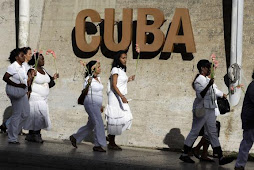By ARTHUR CYR
Syndicated columnist
Published: Tuesday, February 14, 2012 at 6:44 a.m.
Yet another intimate portrait has just emerged about one of the most
prominent and pivotal world leaders of the early 1960s, arguably the
most dangerous and highly charged years of the Cold War.
An iconic hero for many, thanks to his charismatic personality and
demonstrated courage, this former head of state is also controversial
thanks to personal behavior, which can only be described as reckless.
This reference of course is to Fidel Castro, who at age 85 has published
an appropriately lengthy autobiography in two volumes and numbering
approximately 1,000 pages. According to Havana's state television,
Castro described his literary work in detail over six straight hours
before a convention center audience.
Age and illness led Castro to retire from Cuba's presidency in 2008; the
country since then has been led by Raul Castro, by all accounts firmly
in charge but lacking his older brother's appeal. Enemies join with
admirers in agreeing that Fidel Castro possessed a unique leadership style.
After Havana was captured and despised dictator Fulgencio Batista fled
in early 1959, Raul Castro handled bloody mass executions with efficient
dispatch, and since has effectively led the military and a pervasive
domestic security apparatus.
Soon after taking power, the brothers Castro ended hopes for
representative democracy.
They nationalized major industries, including U.S. corporate assets.
Fidel Castro highlighted Cuba's alliance with the Soviet Union by
joining Nikita Khrushchev in a remarkably raucous 1960 visit to the
United Nations in New York, punctuated by the Soviet leader publicly
pounding a shoe on a desk.
The Eisenhower administration began a clandestine effort to overthrow
the increasingly radical regime.
The successor Kennedy administration drastically escalated such efforts.
The Cuban missile crisis of October 1962 stands out as especially
dangerous among Cold War confrontations.
In recent years, the evolution of the Americas toward democratic
governments has been striking.
As a result, Cuba is more isolated than ever.
The Soviet Union, the main source of subsidy, collapsed nearly two
decades ago. Venezuela provides much more limited aid.
When Fidel Castro stepped down, Secretary of State Condoleezza Rice in a
formal public statement endorsed the desirability of "peaceful,
democratic change" in Cuba and also suggested that the international
community work with the people there.
The Bush administration had been pursuing a particularly restrictive
hard line toward Cuba.
President Barack Obama early in his administration loosened extremely
tight restrictions on interchange with Cuba. Cuban-Americans are now
allowed to travel and send financial remittances to relatives still
living there.
Additionally, telecommunications companies may pursue licensing
agreements in Cuba.
As part of such efforts, we should work to expand cultural as well as
personal family exchanges with the island.
President Dwight D. Eisenhower initiated comparable programs with the
Soviet Union during the height of the Cold War, to great benefit.
The punitive Helms-Burton Act, passed during the Clinton administration
in an effort to court the fiercely anti-Castro Cuban population of
Florida, does not prohibit these exchanges.
For Raul Castro, encouraging trade and investment are priorities, along
with loosening restrictions.
At the end of January, he presided over a national conference of the
Cuba Communist Party, which emphasized these goals.
This represents remarkable acceptance of reality. Everyone favoring
democracy and competitive market economies should be encouraged.
Arthur I. Cyr is Clausen Distinguished Professor at Carthage College.
Email him at acyr@carthage.edu.
http://www.newschief.com/article/20120214/NEWS/202145005/1013/opinion?p=all&tc=pgall





No comments:
Post a Comment